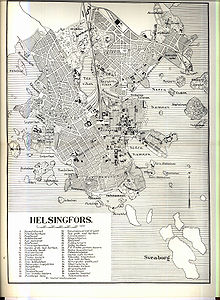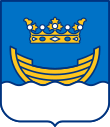Timeline of Helsinki
The following is a timeline of the history of the city of Helsinki, Finland.
Prior to 19th century[]
| Part of a series on |
| Scandinavia |
|---|
 |
|
19th century[]

Map of Helsinki, 1837
- 1808
- 1810 - Population: 4,065.[5]
- 1812
- Helsinki becomes capital of Grand Duchy of Finland.[6]
- Esplanadi park opens.
- 1815 - established.
- 1819 - Sinebrychoff Brewery founded.
- 1822 - Government Palace built.
- 1826 - Helsinki Old Church built.
- 1827 - Engels Teater, the first theatre, is built.[2]
- 1828 - The Royal Academy of Turku relocates to Helsinki.[3]
- 1829 - Hietaniemi cemetery and University of Helsinki Botanical Garden[7] established.
- 1846 - Finnish Art Society[8] and symphony orchestra[9] founded.
- 1847 - Suometar newspaper begins publication.
- 1848 - Drawing school established.[8]
- 1849 - Helsinki University of Technology founded.
- 1852
- 1860
- Swedish Theatre built.
- Population: 22,228.[5]
- 1862 - First Helsinki railway station opens with service to Hämeenlinna.[3]
- 1864 - Hufvudstadsbladet newspaper begins publication.[11]
- 1868 - Uspenski Cathedral built.
- 1870 - St. Petersburg-Helsinki railway built.[3]
- 1871 - University of Arts and Design founded.
- 1872 - .
- 1875 - City Council of Helsinki established.[2]
- 1879 - Alexander Theatre built.
- 1881 - Rikhardinkatu Library opens.[2]
- 1882
- 1884 - Electric power plant begins operating.[2]
- 1886 - Kaivopuisto park established.
- 1887 - Ateneum[8] and Hotel Kämp built.
- 1888 - Kauppahalli built.[15]
- 1889
- Zoo opens.
- Päivälehti and Helsingin Sanomat newspapers begin publication.[11]
- 1890 - Population: 61,530.[5]
- 1891
- Horse-drawn tram begins operating.[2]
- Fazer in business.
- 1893
- Helsinki harbour rail begins operating.
- Winter garden opens.
- 1894 - Statue of Alexander II of Russia erected in Senate Square.
- 1895 - Demari newspaper begins publication.
- 1896 - Population: 77,484.[16]
- 1898 - Kauppalehti newspaper in publication.[11]
- 1900 - Electric tram begins operating.[2]
20th century[]

Map of Helsinki, c. 1900s
1900s-1940s[]
- 1902 - Finnish National Theatre building constructed.
- 1904
- Governor-General Nikolai Ivanovich Bobrikov assassinated by Eugen Schauman.
- Population: 111,654.[5]
- 1906
- 26 February: 1906 Helsinki bank robbery.
- Helsinki Synagogue built.
- 1908 - Helsinki Workers' House built.
- 1909 - Seurasaari Open-Air Museum and [17] established.
- 1911
- Helsinki School of Economics founded.
- Domestic Opera founded.[citation needed]
- Helsinki City Museum opens.[18]
- 1912 - Helsinki Stock Exchange founded.
- 1917
- May: occurs.
- Helsinki Workers' Council formed.[19]
- 1916 - National Museum of Finland opens.
- 1918
- Civil war.[3]
- British submarine flotilla in harbor.
- 1919
- 1922 - Arthur Castrén becomes mayor.[21]
- 1924 - Natural History Museum of Helsinki established.
- 1926
- Yleisradio begins broadcasting.
- Citizens' College Helsinki founded.[12]
- 1928 - opens.
- 1930 - Population: 205,833.
- 1931
- Antti Tulenheimo becomes mayor.[21]
- Parliament House built.
- Hotel Torni opens.
- 1932
- Eläintarhan ajot (motor race) begins.
- Ilta-Sanomat newspaper begins publication.
- 1936 - Lasipalatsi built.
- 1937 - Savoy hotel founded.[15]
- 1938
- May: Second International Aeronautic Exhibition held.
- Helsinki-Malmi Airport and Stadium open.
- Klaus Kurki hotel established.[22]
- Tennispalatsi built.
- 1939 - Bombing by Soviets.
- 1944
- Bombing by Soviets.
- becomes mayor.[21]
- 1946 - Haaga, Huopalahti, Kulosaari, and Oulunkylä become part of city.[2]
- 1947 - Helsinki Swimming Stadium built.
1950s-1990s[]
- 1950
- Linnanmäki amusement park opens.[2]
- Population: 368,519.
- 1951 - Marimekko founded.
- 1952
- Helsinki Airport opens.
- 1952 Summer Olympics held in Helsinki.[2]
- 1956 - becomes mayor.[21]
- 1957 - Kansan Uutiset newspaper begins publication.
- 1960
- Mosque established.[23]
- Lake Bodom murders occur.
- 1962
- City hosts World Festival of Youth and Students.
- Enzo-Gutzeit building constructed.[15]
- 1964 - active.[17]
- 1965
- International Jean Sibelius Violin Competition begins.
- Helsinki City Theatre established.[24]
- 1966 - Helsinki Ice Hall opens.
- 1967 - Sibelius Monument unveiled.[2]
- 1968
- Teuvo Aura becomes mayor.[21]
- Helsinki Festival begins.
- 1969 - Temppeliaukio Church consecrated.
- 1970 - Helsinki Metropolitan Area Council created.[25]
- 1971 - Finlandia Hall built.[15]
- 1973 - Population: 510,614 city; 821,505 urban agglomeration.[26]
- 1975
- Helsinki Accords.[27]
- Helsinki Exhibition and Convention Centre built.[citation needed]
- 1979
- Raimo Ilaskivi becomes mayor.[21]
- Lepakkoluola formed.
- Helsinki Theatre Academy founded.
- 1980
- Iltalehti newspaper begins publication.
- Ring I highway constructed.
- Population: 483,675.
- 1982
- 1984 - Itäkeskus shopping mall built.[2]
- 1986 - Mosque founded.[28]
- 1989 - Night of the Arts begins.
- 1990 - Finnish National Gallery established.[8]
- 1991
- Linux software created by university student.
- Kari Rahkamo becomes mayor.[21]
- 1993
- 1995
- Spårakoff pub tram begins operating.
- Population: 515,765.
- 1996
- Eva-Riitta Siitonen becomes mayor.[21]
- Helsinki Motor Show begins.
- 1997
- Taloussanomat newspaper begins publication.
- Hartwall Areena opens.
- 1998 - Kiasma museum inaugurated.[3]
- 1999 - Finnkino Tennispalatsi (cinema) opens.[17]
21st century[]
- 2002 - 11 October: Myyrmanni bombing occurs in nearby Vantaa.
- 2005 - Jussi Pajunen becomes mayor.[21]
- 2007
- Helsinki Metropolia University of Applied Sciences established.
- Haaga-Helia University of Applied Sciences formed.
- Eurovision Song Contest 2007 held.
- 2009
- 2010 - Aalto University formed.
- 2011
- Restaurant Day begins.[29]
- Sipoonkorpi National Park established.
- Helsinki Music Centre built.
- Helsinki Region Infoshare launched.[30]
- 2012
- Population: 596,233.
- City designated World Design Capital.
- 2017
- Jan Vapaavuori becomes mayor.[31]
See also[]
- History of Helsinki
- Politics of Helsinki
References[]
- ^ Richard D. Lewis (2005). "Finnish History: Chronology". Finland, Cultural Lone Wolf. Nicholas Brealey Publishing. ISBN 978-1-931930-49-9.
- ^ a b c d e f g h i j k l m n o p q r s t u City Museum. "History of Helsinki (timeline)". City of Helsinki. Archived from the original on 18 April 2012. Retrieved 30 September 2015.
- ^ a b c d e f g h i j "Brief history of Helsinki". City of Helsinki. Retrieved 30 September 2015.
- ^ Haydn 1910.
- ^ a b c d Britannica 1910.
- ^ "Finland Profile: Timeline", BBC News, retrieved 30 September 2015
- ^ "Garden Search: Finland". London: Botanic Gardens Conservation International. Retrieved 30 September 2015.
- ^ a b c d Finnish National Gallery. "History". Archived from the original on 10 December 2011. Retrieved 25 July 2012.
- ^ Donna M. Di Grazia, ed. (2013). Nineteenth-Century Choral Music. Routledge. ISBN 978-0-415-98852-0.
- ^ "Leading Libraries of the World: Russia and Finland". American Library Annual. New York: R.R. Bowker Co. 1916. pp. 477–478.
Helsingfors
- ^ a b c "Finland". Europa World Year Book. Europa Publications. 2004. ISBN 978-1-85743-254-1.
- ^ a b c d Walter Rüegg, ed. (2011). "Universities founded in Europe between 1945 and 1995". Universities Since 1945. History of the University in Europe. 4. Cambridge University Press. pp. 575–594. ISBN 978-1-139-49425-0.
- ^ Colin Lawson, ed. (2003). "Orchestras Founded in the 19th Century (chronological list)". Cambridge Companion to the Orchestra. Cambridge University Press. ISBN 978-0-521-00132-8.
- ^ "Russia". Statesman's Year-Book. London: Macmillan and Co. 1885.
- ^ a b c d e New York Times 2006.
- ^ Uschakoff 1898.
- ^ a b c "Movie Theaters in Helsinki, Finland". CinemaTreasures.org. Los Angeles: Cinema Treasures LLC. Retrieved 30 September 2015.
- ^ City Museum. "Hakasalmi Villa - History of the museum building". City of Helsinki. Archived from the original on 13 February 2013. Retrieved 25 July 2012.
- ^ Anthony F. Upton (1980). The Finnish Revolution: 1917-1918. University of Minnesota Press. ISBN 978-0-8166-0905-5.
- ^ "Finland". Statesman's Year-Book. London: Macmillan and Co. 1921 – via HathiTrust.
- ^ a b c d e f g h i "City of Helsinki Mayors 1922-". City of Helsinki. Retrieved 30 September 2015.
- ^ Klaus K Hotel. "History". Archived from the original on 27 January 2013. Retrieved 25 July 2012.
- ^ Jørgen S. Nielsen; et al., eds. (2013). "Finland". Yearbook of Muslims in Europe. 5. Brill. ISBN 978-90-04-25586-9.
- ^ Don Rubin; et al., eds. (1994). "Finland". World Encyclopedia of Contemporary Theatre: Europe. Routledge. pp. 250+. ISBN 9780415251570.
- ^ Major Cities and Their Peripheries: Co-operation and Co-ordinated Management. Local and Regional Authorities in Europe. Council of Europe Press. 1993. ISBN 978-92-871-2394-7.
- ^ United Nations Department of Economic and Social Affairs, Statistical Office (1976). "Population of capital city and cities of 100,000 and more inhabitants". Demographic Yearbook 1975. New York. pp. 253–279.
- ^ Bernard A. Cook, ed. (2013). "Chronology of Major Political Events". Europe Since 1945: An Encyclopedia. Routledge. ISBN 978-1-135-17939-7.
- ^ Göran Larsson, ed. (2009). Islam in the Nordic and Baltic Countries. Routledge. ISBN 978-1-134-01292-3.
- ^ a b Hämäläinen 2014.
- ^ "How Helsinki mashed up "open data" with regionalism". CitiScope. USA. April 2014.
- ^ "Kaupunginvaltuusto valitsi pormestarin ja apulaispormestarit". Helsingin kaupunki. Retrieved 8 June 2017.
This article incorporates information from the Finnish Wikipedia and German Wikipedia.
Bibliography[]
- "Helsingforss", Hand-book for Northern Europe, London: John Murray, 1849
- "Helsingfors", Hand-book for Travellers in Russia, Poland, and Finland (New ed.), London: John Murray, 1865
- William Henry Overall, ed. (1870). "Helsingfors". Dictionary of Chronology. London: William Tegg.
- I. Uschakoff, ed. (1898). "Helsinki". Suomi: hakemisto sisältävä maantieteellistilastollisia ja teollisuutta koskevia tietoja [Finland: Directory] (in Finnish). Helsinki: .
- P. Nordmann, Bidrag till Helsingfors stads historia [Contributions to Helsinki History] (in Swedish) – via HathiTrust 1905–1908, 5 vols.
- . Encyclopædia Britannica. 13 (11th ed.). 1910. p. 252.
- Benjamin Vincent (1910), "Helsingfors, Finland", Haydn's Dictionary of Dates (25th ed.), London: Ward, Lock & Co.
- "Helsinki: City With its Heart in the Country", National Geographic Magazine, Washington DC, 160, 1981
- R.W. Apple Jr. (16 July 2006). "Helsinki's Shining Season". New York Times.
- Timo Hämäläinen (23 June 2014), "Urbanist's guide to Helsinki", The Guardian, UK
External links[]
| Wikimedia Commons has media related to History of Helsinki. |
- Europeana. Items related to Helsinki, various dates.
- Digital Public Library of America. Items related to Helsinki, various dates
Categories:
- History of Helsinki
- Timelines of cities in Europe
- Helsinki-related lists
- Years in Finland
- Timelines of capitals

